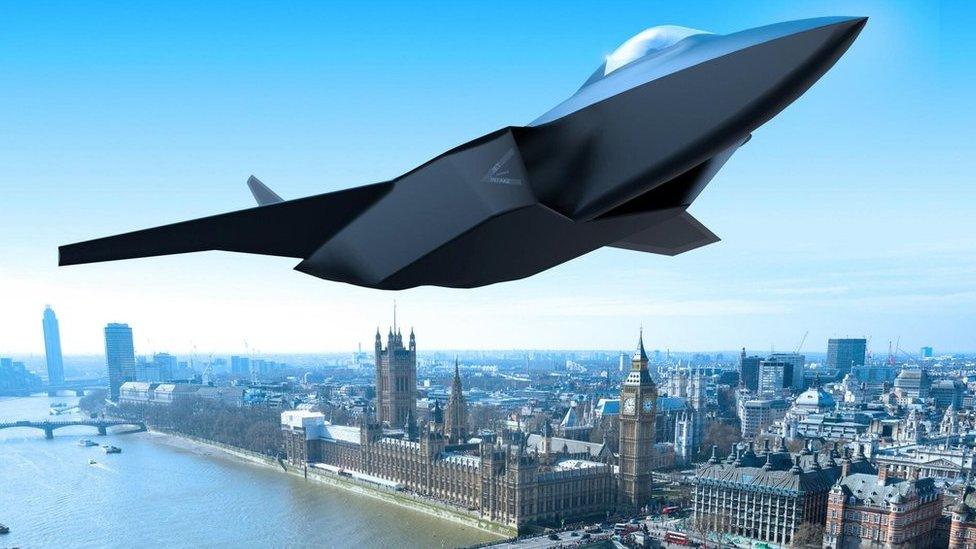Missiles and moon landings: US and Japan boost defence ties
- Published
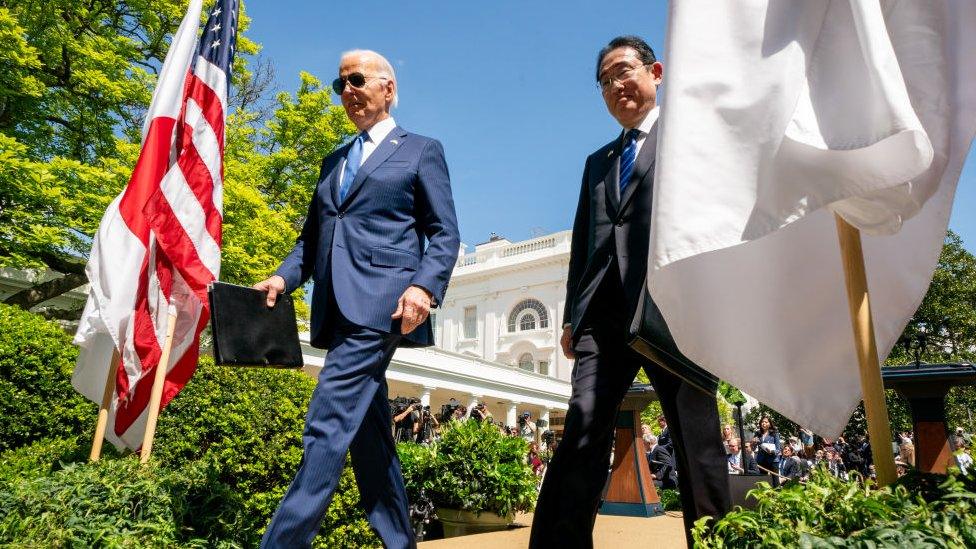
Taiwan and China were a focus of the meeting between Joe Biden and Fumio Kishida.
US President Joe Biden and Japan's prime minister have vowed to strengthen defence co-operation in the face of a potential threat from China.
The plans announced by Mr Biden and Fumio Kishida during his Washington visit include an expanded air defence network incorporating Australia.
Additionally, Mr Biden said a Japanese astronaut would join Nasa's Artemis programme to put people on the Moon.
The astronaut will become the first non-American on the Moon's surface.
Speaking from the Rose Garden of the White House during Mr Kishida's state visit to Washington, Mr Biden said that the deals constituted "the most significant upgrade of our alliance since it was first established".
Over the course of about two hours of talks, the two leaders largely focused on defence matters in the Indo-Pacific, as well as the ongoing conflicts in Ukraine and Gaza.
North Korea, Taiwan and China were a particular focus of the discussions, Mr Kishida said, calling on an "international order based on the rule of law" to be maintained.
"Unilateral attempts to change the status quo by force or coercion is absolutely unacceptable, wherever it may be," Mr Kishida said.
"Regarding Russia's aggression of Ukraine... Ukraine today may be East Asia tomorrow."
As part of the agreements, Mr Biden said that the US military would establish a joint command structure with its Japanese counterparts.
The two allies will also develop a joint air and missile defence network in the region along with Australia, as well as participate in three-way military exercises, along with UK forces.
Mr Kishida acknowledged that, while the US and Japan would continue to respond to "challenges" from China, they "confirmed the importance of continuing our dialogue with China and co-operating with China on common challenges".
In the space sector, Japan will provide and operate a "pressurised lunar rover", while the US will allow two Japanese astronauts to take part in Nasa's Artemis missions and - eventually - allow a Japanese astronaut to become the first non-American to land on the Moon.
The 'closest of friends'
At a welcome ceremony earlier in the day, Mr Biden said the US and Japan had become "the closest of friends".
The two leaders also briefly addressed the recent move by Japan's Nippon Steel to purchase US Steel for about $15bn (£11.9bn), with Mr Kishida saying that Japan hopes the deal "will unfold in directions that would be positive for both sides".
Mr Biden, for his part, vowed to "stand by" American workers as well as the US-Japan alliance. In an unusual move last month, the US president said the "iconic" US firm should remain in American hands.
Japan is the largest foreign investor into the US, with more than one million Americans employed by Japanese companies.
"Investment from Japan to the US can only increase upwards in the months and years to come," Mr Kishida said. "And we wish to cement this win-win relationship."
The visit continued on Wednesday night with a lavish state dinner.
In a formal toast at the event, both Mr Biden and Mr Kishida toasted the US-Japan relationship, with Mr Kishida quoting former President John F Kennedy's remark that the Pacific Ocean "unites" the two countries.
"We are now standing at the turning point in history, embarking on a new frontier," Mr Kishida said, before referencing Star Trek and telling guests "boldly go" where nobody has gone before.
However, the meeting was not met as warmly in Japan - where Mr Kishida's public image has taken a hit due to a widespread corruption scandal in his party.
"Mr Kishida must be enjoying the warm atmosphere (in DC) and the distance from the opposite one here in Japan," political commentator Hideo Yanagisawa said on the Asahi channel.
Newspapers also slammed the meeting, with newspaper outlet the Sankei running a headline that said: "Kishida shouldn't use the summit as a tool for domestic politics."
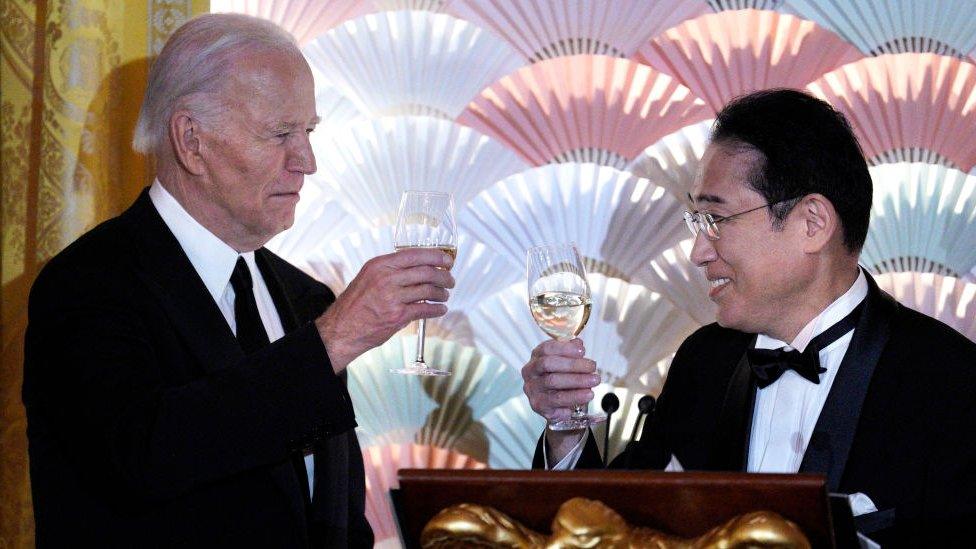
Mr Kishida's US trip has not been warmly received back home in Tokyo
The meeting also comes as Japan is yet again moving further away from its pacifist self - something its been doing so more firmly of late.
Last month, Japan's cabinet approved the export of new fighter jets it is developing with the UK and Italy, albeit under strict rules which include cabinet approval for each sale - and that sales happen where there is no ongoing conflict.
But an agreement to boost Japan's defence makes watchers here very nervous - mainly about the country's potential involvement in any regional conflict.
The tensions between Beijing and Taiwan, the self-governing island China claims as its own, are strongly felt here in Japan.
When China's military rehearsed "sealing off" Taiwan during three days of military drills in April last year, Japan's defence ministry said a Chinese aircraft carrier was sitting just some 230km (145 miles) south of Miyako Island, part of the Okinawa chain.
And when North Korea fires missiles, some land just outside Japan's territorial waters or its Exclusive Economic Zone (EEZ)
Mr Kishida wants to send a message that Japan needs this defence boost to defend itself while playing a more assertive role in the region and on the international stage.
He will on Thursday head to Capitol Hill to address Congress and will participate in a three-way meeting with Mr Biden and Philippines President Ferdinand Marcos Jr that is expected to focus on China.
Related topics
- Published18 August 2023
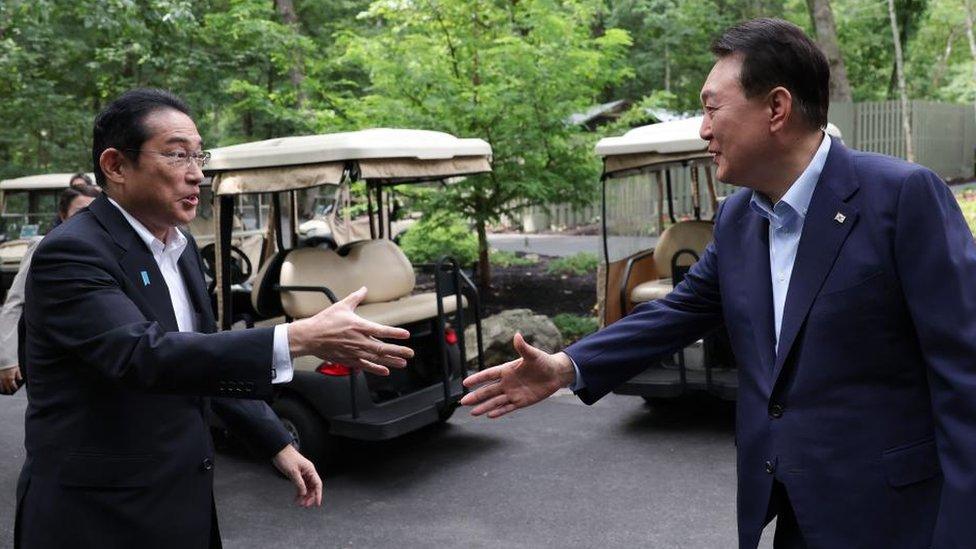
- Published2 April 2024
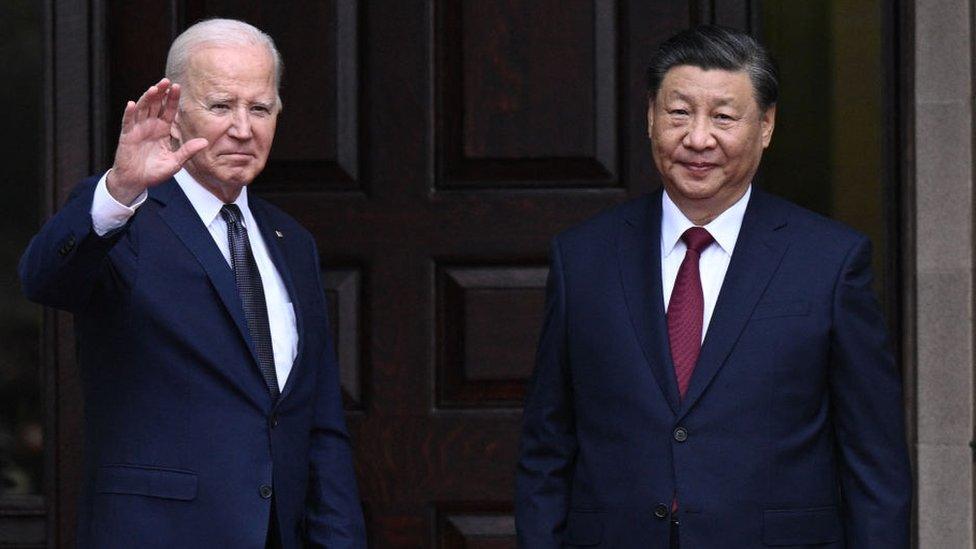
- Published26 March 2024
